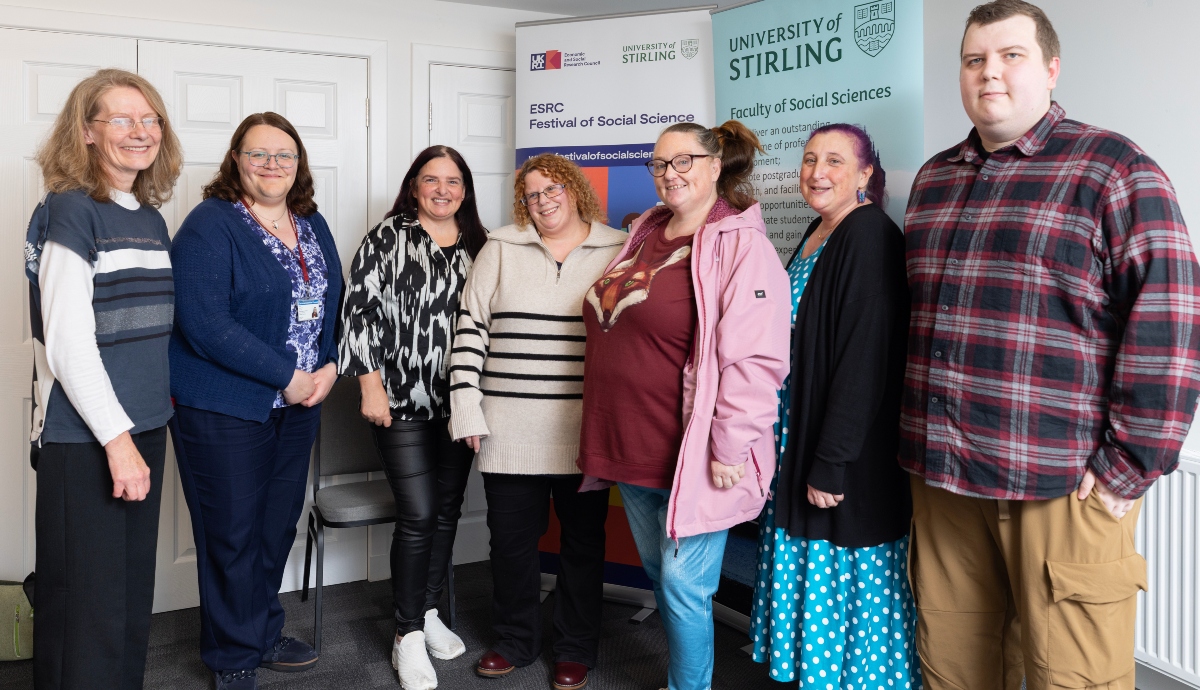Locals and MPs give thumbs-up to Alloa film project
The Stirling-led project saw locals turn historians to produce a documentary about life in the town.
/filters:format(webp)/filters:no_upscale()/prod01/cdn/media/stirling/news/news-centre/2025/nov-25/1200X600-banner-image-alloa-glassworks-film.jpg)
Alloa residents have given a huge thumbs-up to a project which saw locals turn historians to help produce a documentary film about life in the town.
With the guidance of a University of Stirling social scientist, members of a community group called The Thursday Club gathered oral histories from their neighbours and relatives.
The resulting film, Life Beyond the Glassworks: A Documentary of Living and Working in Alloa, was shown at a screening this week in front of a packed room at The Gate, Alloa. The event formed part of the ESRC Festival of Social Science, organised by the University.
MPs have also praised the project, with six parliamentarians sponsoring an Early Day Motion in the House of Commons recognising the work.
A place with many stories
The film weaves together interviews with locals, archive photos and footage, and newly shot videography and photography, to share stories of life in a town which, in its heyday, was renowned for its busy harbour, malt distilleries, glassmaking, wool and weaving. Today, just one distillery and glassworks remain.
One of the interviewers was Heather Lindsay, a member of community group The Thursday Club, who has lived in Alloa since she was eight. She said: “The best bit about being part of the project was seeing people’s memories come back to them as they talked to you. It was making them happy.”
Leading the project was Dr Francis Stewart, Lecturer in Sociology at the University of Stirling, who moved to Alloa in 2023 and admits to being “fascinated” by the Clackmannanshire town.
Dr Stewart said: “Alloa was important for so long but that’s just been lost. Not many people have a nice thing to say about the town but what I see as a newcomer is a strong community and a place with many stories – of the mines, the pits, the factories. It’s seen every stage of the British industrial revolution.”
Dr Stewart, who led a question-and-answer session after the screening, added: “It was clear from previous oral history research I’ve been involved in that having people close to the interviewees carrying out the interviews often produces better material – people feel more relaxed and are happier to talk. I think that’s what makes Life Beyond the Glassworks work so well. You could tell from the audience reaction and the many questions and ideas afterwards that the film hit the right note with people.”
 Some of those involved in the documentary project including (far left) Val Whyte, (second from left) Susan Yule and (far left) Joshua Johnson.
Some of those involved in the documentary project including (far left) Val Whyte, (second from left) Susan Yule and (far left) Joshua Johnson.
A copy of the film will be available to view at Alloa charity The Hub, a collaborator on the project. Both The Hub and Dr Stewart want to keep the project going and gather more oral histories.
Val Whyte, Development Officer at The Hub, said: “Too many stories have been lost, and we want to make sure no more are lost. This is just the tip of the iceberg. We invite people to come and chat, share photos and watch the film.”
The idea for the film came about after Dr Stewart worked with Alloa High School pupils and residents last year to create a photography and sound-based exhibition about Alloa called Hidden Histories.
Passing on skills
Residents involved in Hidden Histories, many of them former employees of factories which have closed down, said they wanted to do more. Dr Stewart spent time training local people through The Thursday Club, passing on her skills as an academic researcher to help them tell Alloa’s stories.
Dr Stewart said: “They were very nervous to begin with but then threw themselves into it and they’ve done brilliantly. All the interviews were conducted entirely by them, and the stories are so compelling – from the days when women were not allowed to keep their wages, or order drinks at a bar, to the impact of maternity leave and women being allowed to have their own bank accounts.”
Also present at the screening were photographer Joshua Johnson, whose work features in Hidden Histories and the documentary, and Susan Yule, an archivist at Alloa Speirs Centre.
The ESRC Festival of Social Science, organised by the University of Stirling, takes place until November 8 and aims to share social science with local communities.
Launched two years ago, the Festival this year features seven events, all with a theme of Our Working Lives, taking place online and in-person in venues across Stirling, Alloa and Glasgow.
The Festival is part of the UK-wide Festival of Social Science 2025 and was made possible thanks to funding from the Economic and Social Research Council (ESRC), which is part of UK Research and Innovation (UKRI).
The University of Stirling festival programme is supported by the Stirling Social Science Impact Acceleration Account (IAA) which promotes the social science research collaborations with partners and communities.
The University of Stirling is world-renowned for its work in social science; it is ranked 1st in Scotland for Criminology, top 5 in Scotland for social policy and Sociology, and top 15 in the UK for education*.
For a list of all events and more information visit www.stir.ac.uk/ESRCFestival
Find out more about the UK-wide 2025 Festival of Social Science at festivalofsocialscience.com
* Source: Times and Sunday Times Good University Guide 2025.
UN Sustainable development goals
The University of Stirling is ranked among the top 200 institutions in the world for its contribution to meeting the United Nations Sustainable Development Goals (SDGs). The research or activity detailed above relates to the following SDGs.



